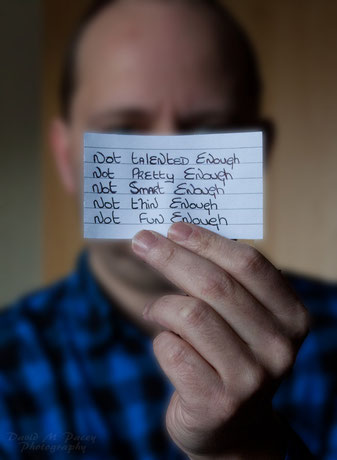Do your inner thoughts ever sound like a cruel Reality TV critic (Simon Cowell, Gordon Ramsay, etc.)?
For example, do you…
- Replay your blunders over and over like a Blooper clip on repeat, except you don’t find it funny?
- Beat yourself up for saying the “wrong” thing?
- Call yourself names, like “idiot,” “failure,” “loser”?
- Get preoccupied with “not measuring up” to your own ideals: “By this age, I should have (fill in the blank)”?
- Resent someone else’s success or opportunities: “It’s not fair…”
- Label yourself “worthless” or “garbage.”
Unlike Reality TV, in real life, there is no commercial break or season finale to offer reprieve from your inner critic. In fact, one of the most devastating impacts ofdepression is the gradual loss of your sense of “enoughness.” Your ability to forgive yourself, nurture yourself, and offer yourself grace may be at an all-time low. If this describes you, here are some coping ideas that might help.
- RECREATE YOUR MEASURING STICK
Eleanor Roosevelt said, “No one can make you feel inferior without your consent.” An amazing part of being human is that we have the power to create our own standard for success. If your standard for “enoughness” is based on achievement or performance, it’s no wonder you’re chronically dissatisfied or depressed. There is always room for improvement and greater achievement; life is a finish-line that never arrives.
Consider basing your worth on something deeper, something that doesn’t come or go. Think about the “measuring stick” you’d use on a child that you love. You probably don’t label them “garbage” for making a mistake or not achieving. No, their worth isn’t called into question when they make blunders, and neither should yours. Choose to believe in your intrinsic value as a part of the human race.
- QUESTION THE CRITIC’S VALIDITY
I have never seen a panel of reality TV judges agree with one another on every contestant that walked through the door. Remember that there is a world of subjectivity in self-assessment as well. Don’t trust every negative thought you have. A thought is a thought, not a fact. David Burns, in his book “Feeling Good”, outlined 10 different types of “cognitive distortions.” Cognitive distortions are exaggerated, twisted, or irrational thought patterns that amplify feelings of depression and anxiety. Check out this website for a full list of distorted thought types: healthymind.com/cognitive-distortions.pdf. After you’ve identified an unhelpful thought, try talking back to it.
- DON’T PROJECT YOUR FEELINGS OF INADEQUACY ONTO OTHERS
Watch out for assumptions that you know what other people are thinking. Unless you are Edward from Twilight, you cannot read someone else’s mind (and yes, I just made a Twilight reference).
- GIVE YOURSELF A BREAK, LITERALLY
If you find yourself hung up on a negative self-assessment, try a change of scenery. Go for a walk and take in your surroundings. Take a literal break from your inner world by checking in with your five senses (sight, smell, hearing, taste, touch). Try listening to music, noticing your breath, singing, or taking a bath. Take a break from life’s rat race. Part of the “not good enough” trap is caused by over-analyzing your performance. Being in the present (as in this moment-in-time) may give you the reprieve you need.
If “not good enough” thoughts continue to nag you, professional counseling may be able to help. Our staff at Star Meadow Counseling is available with an array of strength-building coping strategies.

